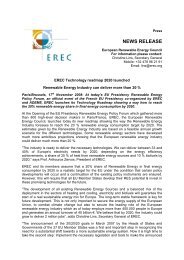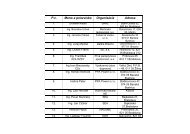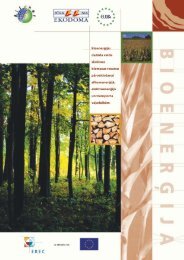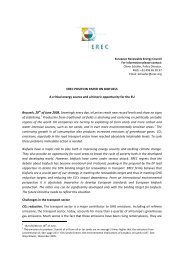CTO Assessment - European Commission
CTO Assessment - European Commission
CTO Assessment - European Commission
You also want an ePaper? Increase the reach of your titles
YUMPU automatically turns print PDFs into web optimized ePapers that Google loves.
PROVINCE OF CHIETI<br />
RES and<br />
Agenda 21<br />
Contact: Giancarlo Moca • Manager • Energy Department<br />
Province of Chieti • Corso Marrucino 97 • 66100 Chieti • Italy<br />
Tel +39 08714084218 • Email: sviluppo.ambientale@provincia.chieti.it<br />
Website: www.provincia.chieti.it or www.alesachieti.it<br />
Chieti is the most southerly province of the<br />
Abruzzo, Italy. As this region had not developed<br />
an energy plan, Chieti decided to<br />
design its own energy strategy. The guidelines<br />
closely follow those of the <strong>CTO</strong> and<br />
the more general framework of the White<br />
Paper. There are two reference periods: one<br />
up to 2003, the other up to 2010, the<br />
latter being more ambitious and with<br />
longer-term effects.<br />
Main motivations<br />
The Province of Chieti intended to promote<br />
the development of its territory in a really<br />
sustainable sense. The concrete application<br />
of the Local Agenda 21's principles<br />
had as its first important steps the promotion<br />
of renewable energy sources with the<br />
approval of all stakeholders.<br />
Project details<br />
The specific goals of the plan include:<br />
Installation by 2003 of 2,000 m 2 of solar<br />
thermal panels<br />
Development of wind energy through the<br />
installation of wind turbines in various<br />
areas, amounting to 205 MW by 2003.<br />
Fostering the use of biomass in private<br />
homes (3,000 houses) and large buildings,<br />
through the use of olive pressing<br />
sand forestry waste<br />
Exploiting the potential of photovoltaic<br />
panels in industrial and commercial centres<br />
Use of waste for electricity production<br />
(2010)<br />
Encouraging the generalisation of the<br />
use of liquid biofuels for public transport<br />
(consumption of 6,000 tonnes a<br />
year for public transport in 2003, and<br />
10,000 by 2010)<br />
Bolstering measures related to the rational<br />
use of energy, such as introduction<br />
of co-generation systems<br />
Improving the monitoring of environmental<br />
status, through the design and<br />
preparation of a battery of indicators to<br />
be collected periodically.<br />
Innovative financing scheme<br />
The programme tackles the energy problems<br />
facing sustainability, according to the<br />
criteria dictated by LA21. In this it has<br />
adopted the community principle of promoting<br />
strategical geographical partnerships<br />
and sectoral ones often integrating<br />
one with the other in the various actions.<br />
Enabling factors<br />
The establishment of the Provincial Agency<br />
helps the diversification of energy sources and<br />
channels the efforts of the different socialeconomic<br />
actors, as well as it helps them to<br />
look for appropriate funding.<br />
Challenges<br />
The legal barriers concern the big plants, in<br />
particular, especially in terms of environmental<br />
impact assessment (wind farm) and emissions<br />
in the atmosphere. The agency is also in<br />
SHP<br />
Biomass<br />
Wind<br />
Solar thermal<br />
Solar photovoltaic<br />
Planning<br />
Sustainable<br />
village<br />
charge of the design, the implementation and<br />
the monitoring of the provincial energy plan.<br />
The administrative barriers are linked above<br />
all to the realization of the household plants in<br />
the residential area. They are often not permitted<br />
in the municipality plans because of<br />
their visual impact. Another notable barrier is<br />
getting the community to accept the big plants,<br />
in particular due to the visual effects they have<br />
on the landscape.<br />
Replication Potential<br />
The project has a high degree of replicability,<br />
above all for the adopted methodological approach.<br />
The method demonstrates that a local<br />
government can and must work to promote<br />
and coordinate local partnership.<br />
Environmental and social targets<br />
The reduction of CO 2<br />
emissions is about<br />
180 Ktons/year.<br />
The activity has stimulated the market to<br />
create approximately 250 new job opportunities.<br />
205 MW. At least 6 abandoned micro-hydro stations will be<br />
put back into use.<br />
District-heating systems with a production of 7 MW coming<br />
form the combustion of olive pressings and forestry wastes.<br />
Other projects included gas cogeneration (CHP) and small-size<br />
wood-fuelled electricity generating systems for mountain and<br />
rural areas. Biofuels mixed with diesel for public transport.<br />
Objective: to install new privately-owned wind farms with<br />
an estimated capacity of 205 MW.<br />
Tthe province of Chieti is actively involved in the National<br />
Programme “Solare termico” project, sponsored by the Italian<br />
Ministry of Environment. The objective is to install 20.00 m2<br />
of solar panels by 2003.<br />
Installation of solar panels in commercial centres and<br />
factories.<br />
Realization of the provincial coordination plan, with particular<br />
restraints for the common planning to diffuse RES through the<br />
administrative implementation, promotion and simplification<br />
In this exemplification on medium scale the technical and<br />
management expedients for the sustainable development, in<br />
terms of residential use of the territory, have to be applied to<br />
reduce consumptions and impacts.<br />
64 <strong>CTO</strong> - Showcase


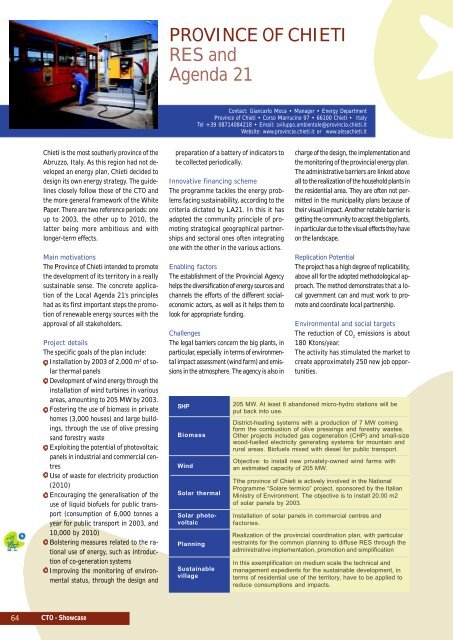
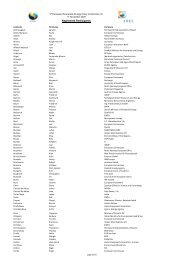
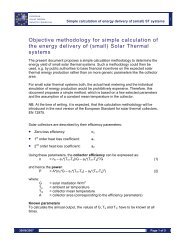
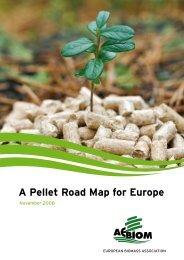
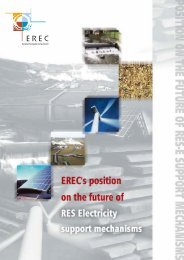
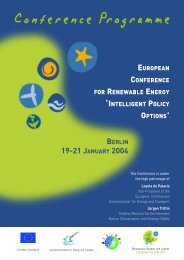
![Energy [R]evolution - Greenpeace](https://img.yumpu.com/47174859/1/184x260/energy-revolution-greenpeace.jpg?quality=85)
